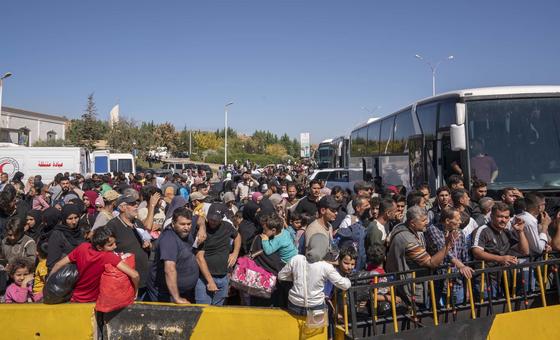“The fires of conflicts are raging the Occupied Palestinian Territory, including Gaza, and in Lebanon. And the heat is being felt in Syria too – spiralling escalation is already having a major impact on Syria and Syrian civilians,” Geir Pedersen said, briefing ambassadors on the Security Council.
“I want to issue a clear warning: regional spillover into Syria is alarming and could get much worse, with serious implications for Syria and international peace and security. Syria demands our collective attention.”
Displacement crisis and Israeli strikes
Around 425,000 people, including 300,000 Syrians, have crossed into Syria from Lebanon in recent weeks, fleeing intensified airstrikes and violence. These movements are aggravating Syria’s ongoing humanitarian crisis, with worsening shortages of essential services such as fuel and water.
In addition, Israel carried out over 116 airstrikes across Syria since 7 October last year, targeting infrastructure and urban centres, including the capital Damascus, claiming that it targetted Hezbollah and Iranian-linked arms routes.
“However, the Syrian Government and many monitors too have highlighted the heavy impact on civilians, with alarming reports of civilian deaths and casualties from Israeli strikes, as well as damage to some civilian and economic infrastructure,” Mr. Pedersen said.
The bombardment has also disrupted key trade routes between the Lebanese capital Beirut and Damascus, cutting commercial traffic and causing gasoline prices in Syria to double.
Military tensions
Mr. Pedersen further noted the Israel Defense Forces (IDF) carried out construction activity in the vicinity of the area of separation in the Occupied Syrian Golan, with an IDF battle tank and excavators crossing the ceasefire line into the area of separation.
“Pursuant to the 1974 Disengagement of Forces Agreement, no military forces, equipment or activity by either Israel or Syria are permitted in the area of separation,” he said, adding that drone strikes and rocket fire were reported near the area, adding to regional tensions.
Regional escalation also fuelled conflict in northwest Syria, where the terrorist group Hayat Tahrir al-Sham launched cross-line attacks on Government-held areas. Russian airstrikes also resumed and pro-Government forces “significantly accelerated” drone strikes and shelling, resulting in civilian casualties and infrastructure damage.
At the same time, in the northeast there were reports of attacks resuming on United States military bases, prompting reported US artillery fire. “This is aggravating tensions in an area that was already seeing elevated hostilities, between the Syrian Democratic Forces (SDF), Government forces and armed opposition groups, as well as some reports of Turkish drone strikes,” Mr. Pedersen noted.
Urgent de-escalation needed
Mr. Pedersen appealed for the protection of Syria’s sovereignty, stressing that Syria must not become a battleground for foreign powers to settle scores.
He warned that further escalation could unravel fragile ceasefire agreements in place for four years, making peace efforts even harder.
Reiterating the need for humanitarian aid, he urged international donors to increase support for Syria. He also emphasized the importance of resuming the stalled Syrian peace process under Security Council resolution 2254.
Call for international support
With regional conflict intensifying and humanitarian crisis worsening, Syria is s now facing new pressures, Edem Wosornu, Director of Operations at the UN Office for the Coordination of Humanitarian Affairs (OCHA) told ambassadors.
She noted that Damascus has kept borders open and introduced eased entry procedures, including temporarily waiving currency requirements and accepting alternative forms of identification.
Host centres have also been established across 10 governorates, providing temporary shelter, education, and healthcare services.
However, additional international support is crucial as increased need for assistance has put pressure on already stretched humanitarian budgets.
Earlier this month, the UN alongside humanitarian partners launched an inter-agency appeal for an additional $324 million to support up to 480,000 people over the next six months.
Address long-term issues
Ms. Wosornu also warned that Syria’s long-term humanitarian needs must not be overlooked amid regional crises.
Emergency assistance in the immediate term and long-term recovery efforts, are both vital to prevent the crisis from further deepening, she said, noting also that the UN plans to launch an Early Recovery Strategy for 2024-2028, aiming to improve healthcare, education, water management, and sustainable livelihoods.
“Syrians have been suffering for far too long. Alongside de-escalation in the region, efforts for peace and stability in Syria are as urgent now as they have ever been,” she said.

